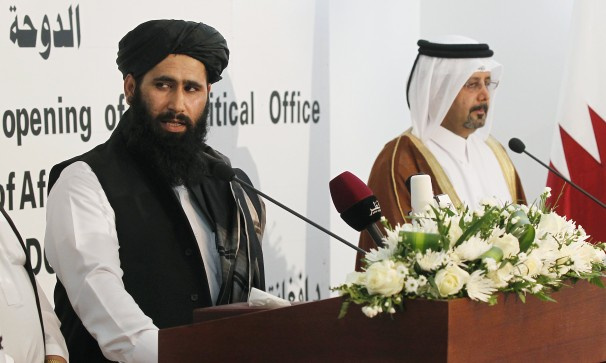Possibility of Afghanistan’s Disintegration

What is the US’ objective in proposing negotiations with the Taliban?
The fact is that the Americans did not enter Afghanistan to fight against terrorism and destroy the Taliban and radical groups including al-Qaeda. They had rather intervened to manage this scene.
Since the beginning of their intervention in Afghanistan and with the cooperation of the Northern Alliance, they succeeded in toppling the Taliban government. The US forces had the capability to destroy the Taliban, al-Qaeda, and other radical groups, but they did not want to do so.
At that juncture, Pakistan’s intelligence agency provided the ground for the entrance of radical groups into Pakistan and the Taliban entered the Waziristan region in Pakistan to prevent being damaged in the Afghan wars. Despite the fact that the northern forces were ready to fight against the Taliban until the last minute and destroy them, they did not receive permission from the West, and in particular the White House, to act upon it.
Now, after a decade, we can comprehend why these developments happened. The reason is that the US’ goal was not to annihilate radicalism; they rather intended to organize this phenomenon along the lines of its objectives.
It seems that, at the present time, the US pursues a new policy and this will be a new deal. If, at one time, the US used radical Afghan groups against the interests of the Soviet Union, the arrow of this policy has gradually changed direction. Although the Soviet Union does not exist anymore, Central Asia, Russia, the Xinjiang region of China, Syria, and North Africa are the places where al-Qaeda and the radical groups can show their efficiency to the western world.
It must not be forgotten that the US is in huge competition with Russia and China; therefore, it cannot be said that the reason behind the US’ intention to negotiate with the Taliban is its failure in Afghanistan. They are well aware of what they are doing and the future will judge their actions and reveal why they negotiated with the Taliban.
So why are they attacking the Taliban in Pakistan?
The Taliban that exists in Pakistan considers the US as its enemy. The radical Taliban groups are both against Pakistan and the US. But if a compromise is supposed to be reached, it will undoubtedly be done by the moderate movements. This movement manages the scene and changes the atmosphere towards the interests of the West.
From the US viewpoint, those groups who intend to enter into war with the US must be annihilated, but those who seek compromise must go to Central Asia, China, Russia, Iraq, and Syria in order to advance the US’ objectives. The important point here is that those groups like al-Qaeda and Taliban are better left unaware that they are being used by the West.
The issue which must not be ignored is that there is a possibility of Afghanistan’s disintegration. For example, the southern part of this country which mainly covers Pashtun-inhabited regions would be given to the Taliban and the Durand Line border with Pakistan would be removed. This matter would lead to the free passage of the Pashtuns between the two countries and ultimately, with the merger of the Pakistani Taliban, a country named Pashtunistan would be created.
Nevertheless, these are the plans that are now being proposed but no one can tell which one will be enforced.
What would Pakistan’s position be with regard to the creation of a country called Pashtunistan?
It would be very difficult for the government of Pakistan to deal with this matter, for its future would be questioned. Islamabad will do its utmost, but they had opposed Bangladesh’s independence but Bangladesh did gain its independence. The future of the region is not clear yet, but it seems that if disintegration is supposed to happen in the region, it will take place with the coordination of the central governments of Islamabad and Kabul.
What is the relation between negotiations with the Taliban, in general, and the exit plan of the US forces from Afghanistan?
Two hypotheses can be discussed in this regard. The first is that the US is being defeated and intends to render the power to the Taliban.
The second is that they seek to manage the crisis and will not, under any condition, render the power to the Taliban, for in that case none of the Afghan groups would accept this issue.
It seems that the US will remain in Afghanistan by establishing numerous bases in this country and controlling the scene itself. If this hypothesis is enforced, it can no longer be said that Washington has been defeated in the Afghan War.
How would you, as an expert, assess the prospect of negotiations between the US, the Taliban, and the government of Afghanistan?
In general, difficult negotiations await them, for the Taliban pursues two major methods which they have not lost during the years when they were not in power. The first is that from a religious aspect, it is considered inclusive and they cannot accept to hold only part of Afghanistan and that other groups control the other areas. They also know that the majority of the Afghan population is Pashtun.
The second is that the Taliban is politically inclusive as well; except during the past decade when the US has attacked Afghanistan, the Taliban had ruled over this country for 30 years.
The US must attempt to balance these two characteristics of the Taliban; otherwise they will not succeed in reaching their goals. Afghanistan has almost 56 tribes and it is difficult, at this time, to predict the outcome of these negotiations.

